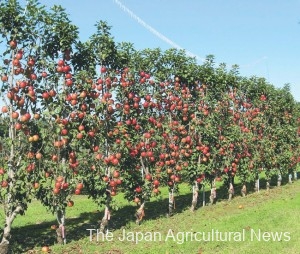TOKYO, June 12 — National Agriculture and Food Research Organization (NARO) announced on June 11 that it has developed Benitsurugi, a new columnar apple variety.
Columnar apple trees grow in an upright form without the branches extending horizontally like in typical apple trees, making it easier for growers to manage them and enabling them to harvest the fruit using picking machines, leading to improved work efficiency.
It is a mid-season variety and is comparable to major varieties in terms of quality such as sugar content, NARO said.
It is the first time a columnar apple grown for eating raw that meet a certain standard was developed in Japan.
It took NARO some 30 years to develop Benitsurugi by crossbreeding Fuji, a major Japanese apple cultivar, with a columnar apple variety imported from Canada, and then crossing it with Sansa, an early-ripening variety.
The new variety can be cultivated in major production areas in the country.
NARO said it will take a year or two to start providing apple growers with young trees.
Because the fruits are produced on short spurs that develop along the main trunk, if the trees are planted in a row in orchards, apples will grow in a planar shape like a wall.
Fruit thinning and harvesting work can be simplified and the variety is suited to automatic harvesters.

Benitsurugi columnar apple trees are planted in a row so that the fruits grow in a planar shape. PHOTO COURTESY OF NARO
While NARO is still researching the most appropriate tree height and planting density for the variety, it is aiming at yields 1.5 times the conventional cultivation.

